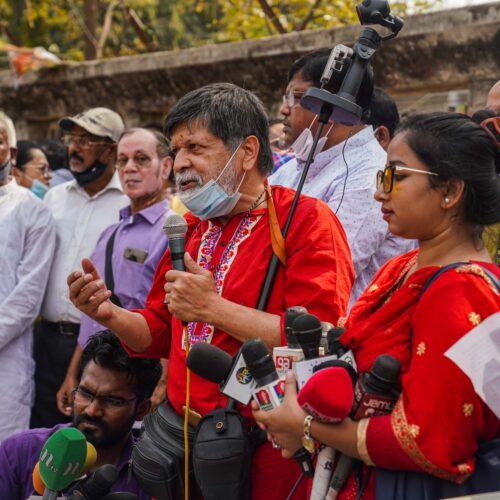Photojournalist in Bangladesh Facing 14 Years for Charges Under a Law That No Longer Exists
This statement can be attributed to the Clooney Foundation for Justice. For further inquiries, please contact [email protected]

Criminal proceedings against award-winning photojournalist and social activist Shahidul Alam have violated Bangladesh’s international human rights obligations, a preliminary report released by TrialWatch said today. Late last year, the Bangladesh Supreme Court issued a critical decision allowing a years-long investigation against Alam to continue, despite the fact the criminal provision under which he was arrested has since been repealed.
In 2018, the same year that Alam was named one of Time Magazine’s people of the year, he was arrested by Bangladeshi authorities, allegedly tortured, and subject to criminal investigation for making “inciteful” statements. The basis for the investigation was a Facebook Live video in which he showed pictures he had taken of student protests about road safety as well as a TV interview with Al Jazeera in which he discussed socio-political tensions that sparked the protests. He now faces up to 14 years in prison.
Alam’s Facebook Live video and his TV interview do not contain any calls for violence. Yet he is accused by the authorities of “causing deterioration in the law-and-order situation” and creating “social unrest [that] motivated [tender-hearted students] to destructive deeds through incitement and instigation” under Section 57 of the Information and Communication Technology Act (ICT Act). Amnesty International previously reported that the ICT Act – primarily Section 57 – has been used to arrest at least 1200 people, a key tool in muzzling dissent in Bangladesh.
Section 57 was repealed while Alam’s case was still under investigation in order to – in the government’s own words – have a better “balance between freedom of expression and public morality & interest.” As a result, the proceedings against Alam have no legal basis. Nonetheless, four years later, the government is persisting in its pursuit of the case.
TrialWatch, a Clooney Foundation for Justice Initiative, monitors criminal trials globally against individuals who are most vulnerable, including journalists and activists, and advocates for the rights of those unfairly imprisoned and for the repeal of discriminatory laws. TrialWatch has been monitoring and evaluating the proceedings against Alam since 2021.
The investigation into Alam should be dismissed or discontinued based on international standards under the International Covenant on Civil and Political Rights (ICCPR), which Bangladesh has ratified. The proceedings violate the ICCPR’s prohibition on prosecutions without a legal basis and the ICCPR’s guarantee of the right to freedom of expression.
Background
Shahidul Alam is an award-winning Bangladeshi photojournalist, teacher, and social activist. He is the founder of both the Pathshala South Asian Media Institute in Dhaka and Chobi Mela, a prestigious international photography festival held in Dhaka.
In July and August 2018, road safety protests spread through Bangladesh, triggered by the killing of two students by a speeding bus. On August 4, 2018, Alam showed pictures he had taken of the demonstrations in a Facebook Live video post, where he also commented on the ruling Bangladesh Awami League’s (BAL) decreasing popularity. He stated that the BAL was “clinging” to power. He separately gave an interview to Al Jazeera, during which he was asked to provide context for the demonstrations and discussed “pent up” anger about the BAL’s actions, including the alleged gagging of the media, extrajudicial killings, disappearances, and corruption. He criticized the crackdown on the protests, describing how he had seen the authorities use tear gas and had also witnessed attacks on unarmed students.
On August 5, 2018, Alam was at his home in Dhaka when a group of 40-50 men in plainclothes reportedly seized him by force, handcuffed him, blindfolded him, and transported him to a detention facility. According to submissions by his wife to the National Human Rights Commission, Alam was tortured. In the police report, Alam was accused under Section 57 of the ICT Act of “spreading false information which included inciteful and crime-like statements broadcast … through Facebook live, which hurt the image of the state by causing deterioration in the law and order situation” and for “hurting the emotions of tender-hearted students through confusing propaganda that created social unrest and motivated them to destructive deeds.”
In October 2018, while Alam was still in state custody, Section 57 of the ICT Act was repealed by a new law, the Digital Security Act (DSA). The DSA established that only cases where proceedings had been initiated before a court or that were at some stage of trial could continue. At the time of repeal, Alam’s case was at the preliminary investigation stage, no charge sheet had been filed, and the case was not before any court or at any stage of trial.
On this basis, Alam petitioned the Bangladesh High Court to challenge the continuation of the case against him. In March 2019, the High Court made an initial finding that the police did not have jurisdiction to investigate Alam’s case due to the repeal of Section 57, issuing an interim order halting the investigation for three months. When the government appealed this order before the Appellate Division of the Supreme Court (Appellate Division), the Appellate Division directed the High Court to decide Alam’s petition on its merits by December 2019.
However, the High Court did not hear the case for two years. When hearings finally took place in November and December 2021, the High Court dismissed Alam’s petition on technical grounds, stating that he should have used a different procedural mechanism and refusing to decide on the legitimacy of the continuation of the criminal investigation. This left the case in limbo and prolonged what had already been a four-year saga. Alam then filed another petition before the Appellate Division to challenge the High Court’s judgment. On November 28, 2022, the Appellate Division dismissed Alam’s appeal, with the result that the criminal investigation against him can proceed.